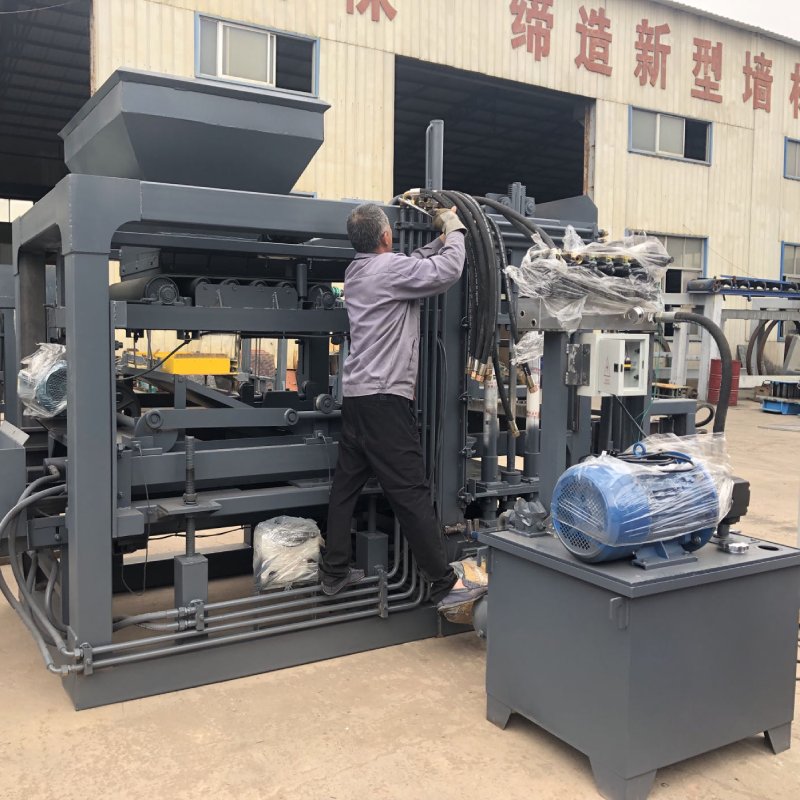
Image source Aiwei Block Machine
Sustainable Block Making Machine for Green Construction
Introduction
The global construction industry stands at a crossroads, facing the urgent need for sustainable practices to mitigate the environmental impact of urbanization and building activities. As the world grapples with the challenges of climate change and resource depletion, innovative solutions are emerging to reshape traditional construction methods. Among these solutions, the sustainable block making machine is a shining example of technological ingenuity that aligns construction with environmental stewardship. This article delves into the concept, features, benefits, and transformative potential of sustainable block making machines in fostering green construction practices.
The Imperative for Sustainable Construction
The construction industry is a significant contributor to environmental degradation, accounting for a substantial portion of global carbon emissions, energy consumption, and waste generation. To address these challenges, the concept of sustainable construction has gained prominence, aiming to minimize negative impacts while enhancing the resilience and longevity of built structures.
The Evolution of Sustainable Block Making Machines
The advent of sustainable block making machines marks a pivotal shift in construction methodology. Traditional brick and block manufacturing often relied on resource-intensive processes that consumed copious amounts of energy and water. Sustainable block making machines leverage advanced technologies to revolutionize the production process, focusing on eco-friendliness, efficiency, and durability.
Features and Components
Sustainable block making machines incorporate an array of innovative features and components that distinguish them from conventional counterparts:
- Recycled Materials Integration: These machines are engineered to utilize recycled aggregates, such as crushed concrete, glass, and industrial byproducts, as raw materials. By diverting waste from landfills, they contribute to resource conservation and reduced environmental impact.
- Energy-Efficient Operation: Advanced energy management systems optimize power consumption, utilizing renewable energy sources whenever feasible. This not only minimizes operational costs but also reduces greenhouse gas emissions.
- Low-Water Usage: Sustainable block making machines employ water-efficient mixing and curing processes, substantially decreasing water consumption compared to traditional methods.
- Modular Design: The modular design of these machines allows for scalability and customization, enabling construction companies to adapt to various project requirements and minimize excess production.
- Emission Reduction: Incorporating emission-control technologies and efficient combustion processes, these machines reduce air pollutants associated with brick firing.
Benefits of Sustainable Block Making Machines
The adoption of sustainable block making machines yields a plethora of benefits that transcend the construction site:
- Environmental Conservation: By utilizing recycled materials and minimizing resource consumption, these machines play a pivotal role in conserving natural resources and reducing waste.
- Carbon Footprint Reduction: The integration of renewable energy sources and energy-efficient processes results in significant reductions in carbon emissions.
- Economic Viability: While the initial investment may be higher, long-term savings in energy, material costs, and waste management contribute to a favorable return on investment.
- Enhanced Durability: Sustainable blocks exhibit enhanced durability and thermal performance, contributing to the longevity and efficiency of built structures.
- Regulatory Compliance: Sustainable construction practices, facilitated by these machines, align with evolving environmental regulations and green building standards.
Transforming Green Construction Practices
The impact of sustainable block making machines extends beyond individual projects, fostering a holistic shift towards green construction practices:
- Resilient Infrastructure: The durability and energy efficiency of sustainable blocks result in buildings and structures that are better equipped to withstand the challenges posed by climate change.
- Community Engagement: Adopting sustainable practices resonates with environmentally conscious communities, fostering positive relationships and reputation for construction companies.
- Innovation and Collaboration: The pursuit of sustainable solutions drives collaboration between stakeholders, fostering innovation and knowledge sharing.
- Global Implications: The widespread adoption of sustainable block making machines contributes to global sustainability goals, paving the way for more responsible urbanization and development.
Challenges and Future Prospects
Despite the promising benefits, challenges such as cost barriers, regulatory hurdles, and industry inertia exist. Continued research, development, and collaboration are vital to overcome these obstacles and fully integrate sustainable block making machines into mainstream construction practices.
Conclusion
The sustainable block making machine is more than a technological innovation; it represents a paradigm shift towards a greener and more sustainable construction industry. By aligning production processes with environmental responsibility, these machines exemplify the transformative power of technology to address pressing global challenges. As construction companies and stakeholders increasingly recognize the value of sustainable practices, sustainable block making machines stand poised to reshape the industry, creating a built environment that is resilient, efficient, and harmonious with the planet.
